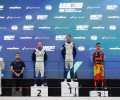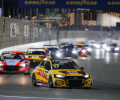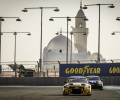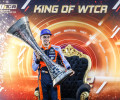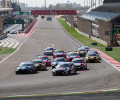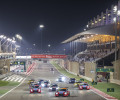WTCC - DOING IT THE HARD WAY
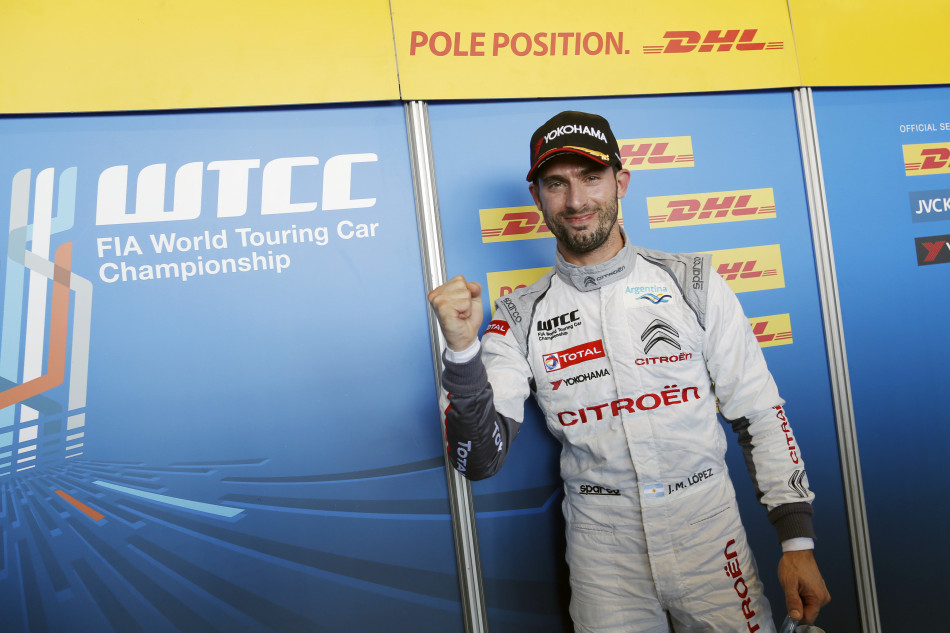
There’s a photo of José Maria Lopez, which you’ll see on your right, showing the Argentinian clambering out of his Citroen C-Elysée at Thailand’s Buriram Circuit Last November. Fists clenched, tears about to stream down his face as the realisation that a second consecutive World Touring Car Championship title is his, it’s an image that somehow encapsulates not just his 2015 triumph, but also a will to overcome adversity that has characterised Lopez’s racing career since his earliest days on the international stage.
But that comes later. First, there’s his second WTCC title to review. The bare stats – 10 wins and nine other podiums from 24 races – suggest that Lopez’s progress to his second world crown was more gambolling sprint than forced march, but the 32-year-old is typically speedy in quashing that notion.
“I think I got very emotional [in Thailand] because it was a really hard year in terms of competition,” he says. “I had to push a lot and I had to... well, I’m Latin, so I thought of my family. A lot of things go through your mind at that moment because it’s something so important. Then you relax, and of course the emotions come.
“I think last year [after winning the title at the rst time of asking in 2014] I had already a little bit more pressure because of being champion,” he adds. “I was looking at the press coverage and Yvan [Muller, his four-time WTCC Champion team-mate] was kind of saying that my rst year was a bit lucky, and that he had a lot at DNFs. I had to show that it was not just lucky.
“But the competition was harder. My rivals worked so hard. I saw Yvan and Sebastian [Loeb, nine-time World Rally Champion] pushing so much harder. I knew it was going to be more di cult. And it was; it was a much harder year for me.”
Lopez’s season start belied that notion as he rattled o four wins and three other podium nishes in the rst eight races to open up a 50-point gap to then closest rival Loeb after the championship’s triumphant return to the historic Nurburgring Nordschleife in May.
It looked like Lopez would simply stretch away, but that was without reckoning on Muller’s dogged determination. Lopez admits he may have let his 50-point comfort zone dull the senses a little.
“I think after the sixth or seventh race of the season and I was a little bit more relaxed, maybe too much,” he says. “Yvan won in Russia and in Slovakia and he caught up a little bit on the championship. I saw that if I didn’t keep pushing, he would really come back strong.”
For Lopez the de ning moment of the season came at France’s Paul Ricard circuit, where he rediscovered the pace he felt had been lacking at Moscow Raceway and the Slovakia Ring.
“I was slow in Moscow, so slow!” he laments. “Then I had a jump-start penalty in the second race in Moscow and suddenly Yvan was catching me [in the standings]. We went to Ricard and I quali ed third. It was looking not so good again. In the second race, I started from the back of the grid and I had a little bit of an incident with Tiago Monteiro, but in I ended up winning the race. Yvan nished only fourth and after that I think that was the turning point. That race was very important in the championship.”
The win in France signalled the end of Lopez’s mini-slump and over the next four rounds he reprised his season-opening form, taking four wins and two podiums to seal the title in Thailand before claiming a nal win of the season at the last round in Qatar.
That determination not to let opportunity slip harks back, as mentioned, to Lopez’s earliest days in international motor sport.
After early success in karting in Argentina, Lopez moved to Europe and rose through the ranks to a position in Renault’s junior programme, being groomed for Formula One. His was a gilded ascent, but one that all too quickly turned to base metal.
“My last two years in single-seaters in Europe were really tough,” he recalls of his time in GP2 as a Renault protégé. “I had a lot of pressure from the head of the Renault Driver Development programme. They always said: ‘You have to win. You have to win.’ But somehow... already at the beginning of the season I knew I was not going to. Super Nova, the team I was with, wasn’t a winning team anymore, and a few years later closed down. I knew I had to win to get to F1 ,but I knew also that it would be almost impossible.
“So the pressure was immense and it a ected my enjoyment of racing. Getting in the car was a lot of pressure. I couldn’t handle it. I don’t blame the team. I made a lot of mistakes,” he adds. “I was young. I was kind of lost. The combination of all those pressures made me lose my way.”
DISCOVERING TOURING CARS
Dropped by the Renault programme at the end of 2006, Lopez, disillusioned with racing, retreated to Argentina.
“It happens to a lot of drivers, talented drivers, that at 22 or 23 you’re nished. You spend more than half your life racing and suddenly... it’s over. It happened to me. You either go home or you have nothing. I arrived in my country and nobody knew me. At that moment I didn’t want to continue. It was so disappointing. After four years at Renault, being so close to F1... it was very di cult.
“But I think the most important thing was the support of the family,” he adds. “I had a lot of support from my parents, but I also had a friend who had a team in Argentina who really pushed me.”
That friend was Victor Rosso, an ex-racer who had competed in Europe in the early 1980s, sometimes outqualifying Ayrton Senna. Rosso eventually returned to Argentina to become a team owner in the country’s hugely popular TC2000 touring car series, where he encouraged Lopez to get back behind the wheel.
“Going back to Argentina gave me a love for racing again. I started to enjoy it again. I got back the con dence in myself,” he says. “I spent six months at home and then Victor came to se me. He said: ‘You need to be racing. You cannot just sit at home.’ He convinced me and looked out for me for the rest of the season.
“I did the nal races of the 2007 season. I started to enjoy it and I began to see it from another point of view. I won my sixth race.
Then in 2008 and 2009, I won the title. It was a very good for me.” In 2009 Lopez was in the running for titles in three
championships in his native country. So e ortless was his rise back to the top domestically that Rosso once again began pressing the then 26-year-old to give Europe another try.
“Victor was saying ‘you need to go back. You are really strong. I think you need a chance.’ They started working with my father on a project and surprisingly it gave me the opportunity of a possibly to be in F1 again. I said, ‘why not? I need to try it.’”
Unfortunately for Lopez, that project turned out to be the USF1 team, a haphazard attempt to bring an American team back to grand prix racing during a period when the sport was irting with budget caps and actively trying to encourage low-cost entrants.
Lopez signed a contract and was even announced as a race driver for the squad for the 2010 World Championship season. Then, all of a sudden, everything went a quiet.
F1 DREAMS IN TATTERS... AGAIN
“It was very painful. We were working really hard and we put a lot of e ort into trying to get the sponsorship money raised in a country where obtaining sponsorship is not really easy,” he recalls. “Myself, I didn’t see it coming. Obviously when I signed, I put my e ort in the physical training because it had been a long time since I’d jumped into an F1 car. And that was my focus; my one and only focus. I didn’t see everything going wrong.
“I was in training and one day I received a call. I was told that everything had become a bit complicated with the arrangement, so we went to England. We tried to do everything we could but in the end it just wasn’t happening. The team broke. It was another really tough moment for my career.”
Once again Lopez slipped back into the arms of national competition, but once again, his father refused to accept defeat.
“My father never lost faith and he always would say things like, ‘I really enjoy you being here but I think you are more from Europe. You’re not really a 100 per cent t in the national championships.” By 2012 he was national champion again, this time in the new
‘Super’ TC2000 series, and the following year the tantalising prospect of a guest drive at the Argentinian round of the World Touring Car Championship arose. Lopez, in the midst of a 42-race programme, reluctantly accepted.
“I went with no expectations, to race a BMW,” he says. “I don’t think anyone had any expectations, because the car and the team [Wiechers-Sport] were not winners. But somehow I ended up winning the second race. It was an amazing weekend. Honestly, if I tried a million times to do it again, it would be impossible. But it worked and I won. Everything changed after that.”
Soon after the race, Citroen made contact, inviting Lopez to test with an eye to elding a third car in the 2014 WTCC campaign.
“I did my rst test in Valencia and it went well. Then in the end of November they contacted me again to test at Monza,” he recalls. “It was the most important test for me because I did very well. I think I managed to be quicker than Yvan, which was amazing.
“There are a few things that people don’t know about that test, though,” he laughs. “I was racing in Argentina and ghting again for the championship. I couldn’t really give up that chance, so for the two tests I left on Monday from Argentina and I arrived on Tuesday. I tested on Wednesday with all the jet lag and everything, and by Thursday I was back on the plane and heading back to race at home. I was destroyed. But it worked out: destiny and a lot of luck.”
The rest is history. Lopez won on his Citroen WTCC debut in Morocco, and with a further nine wins across the 2014 season, went on to become the rst Argentinian FIA world champion since Juan Manuel Fangio claimed his fth F1 title in 1957.
This year, then, brings the possibility of a third consecutive crown, a feat only achieved in the championship’s past by Muller and Britain’s Andy Priaulx. However, with Volvo entering the championship, Honda running a third factory driver and more weight penalties to shoulder due to his Citroen team’s huge success, Lopez believes the challenge will be extreme.
“I would not say that afraid is the word, because of course we are not afraid. But we are very cautious because we know it’s going to be very tough,” he says. “First of all we have 80 kilos of weight, which is not a small thing. Last year, we started with 60, and our competitiors start with zero.
“In the last races of last year we were dominating, but not by more than half a second. So with the weight penalty it’s going to be very tough because obviously the competition will improve. Honda will be a threat, especially with Rob Hu , who I consider to be one of the best drivers. Volvo will be a threat. They have done things in the proper way. They started to develop their car a long time ago, so I see them as strong competition. Overall, I think people shouldn’t expect Citroën to be in the four at the start of the season.”
And even if Lopez is con dent that his team will overcome the weight penalty, he is expecting an even sterner test from his sole team-mate this season – Muller.
“Having Yvan next to me is always tough, because even if I’ve beaten him before, I know he can always strike back. I see how he works and I see how competitive he is. He’s still in great shape. I don’t see Yvan slowing down. It will be hard.”
For Lopez though, the hardship is inevitable. After all it’s been that way his whole career and he wouldn’t have it any other way.
“I’m very motivated,” he says with the kind of rmness you might expect. “I think it’s going to be a really tough season, but it’s still the dream, isn’t it? You have to go for it.”

 Facebook
Facebook Twitter
Twitter